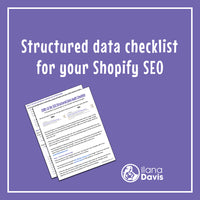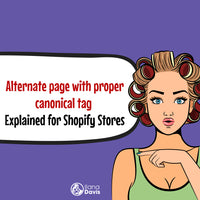Resolving mismatched value price from Shopify to Merchant Center
If you’ve been subject to Google’s disapproved ads with an error Mismatched value (page crawl)
Let’s unmask the culprit so you know how to solve it.
For most stores, there are two major reasons why you may be declined by Merchant Center for a mismatched price.
1. Wrong URL used in the data feed, or
2. Structured data doesn’t match.
Wrong URLs in the data feed
Shopify data feed apps connect to Google Shopping via the Google Sales Channel.
Though not as common of an issue anymore, in the past, some Shopify apps that sent feeds to Merchant Center used incorrect URLs for your products.
Instead of using unique URLs for each variant, they were using product only URLs.
Product only URL: example.com/products/red-shirt
Variant id URL: example.com/products/red-shirt?variant=123456
Shopify moved away from the Google Shopping app and now uses the Google Sales Channel. Since then, this issue hasn’t been as big of a problem. But there may still be some shopping feed apps using the wrong URL. So it’s worth noting.
Solution for the wrong URL in the data feed
I’d recommend checking your data feeds URLs.
Correct any that need to use the Variant ID and then give Google Merchant Center some time to catch up.
Structured data doesn’t match
Structured data is used to help you qualify for Rich Results in Google Search. With the use of structured data, Shopify stores are able to show reviews, pricing, and availability in organic search results.
You may not know it, but there is a relationship between organic search and Google ads.
On the organic side (which uses page content and structured data), there is one set of information.
On the paid traffic/ads side (such as product feeds or reviews feeds), there is another set of information.
The crossover is that Merchant Center on the paid side will check your landing pages on the organic side. Merchant Center then matches the information found on your site with the data feed.
One part of that is to match up the structured data for the product price, availability, URL, and product identifiers such as SKU, MPN, and GTIN.
And here lies the discrepancy.
Not all themes include all your variants or offers in the structured data.
The offers need to include a unique URL and unique product identifier for each variant in the structured data. Merchant Center often wants the GTIN for each variant but I’ve seen some be able to use MPN.
Without the offers at the variant level, Google thinks that one variant’s data applies to all variants. e.g. a $20 price applies to all the variants even though some are $100.
JSON-LD for SEO’s data includes the full variant URL and unique product identifiers, assuming you’ve added them in Shopify. We also provide the ProductGroup schema markup that is needed for Google Merchant Center.
When done right, Google will match up the data feed URL, the visible parts of the product page, and the structured data. That’s to make sure you don’t advertise something for $20 and then charge $100 on the landing page.
Solution for the structured data not matching
There are 2 possible solutions:
1. Add the missing variant information to correct your theme’s structured data. This requires you to know how to code so it’s not a fit for everyone. If coding isn’t your thing, talk to your theme provider and see if they can help.
2. The structured data from JSON-LD for SEO is compatible with Google Merchant Center. Installing JSON-LD for SEO is cheaper than hiring a developer to fix your theme. We also keep your store current with the requirements for both Google Merchant Center and Google Search.
3. I lied. There’s a third option that you may or may not need. Some customers still get disapproved by Merchant Center due to a price mismatch even after addressing the other solutions. If that’s your situation, you may need to also remove the theme’s product structured data. Not everyone needs to do this, so when in doubt, contact me and I can give you advice for your specific situation. I have a short article about how to remove your theme structured data if that’s helpful.
Merchant Center says it can take up to 72 hours, but I’ve also seen this process take much longer. In some cases, upwards of 2-3 weeks before they fully collect and reanalyze the data.
JSON-LD for SEO
Get more organic search traffic from Google without having to fight for better rankings by utilizing search enhancements called Rich Results.
Linking Llama
Link discontinued products to their best substitute. Keep discontinued products published on your website and continue to benefit from traffic to these pages.




